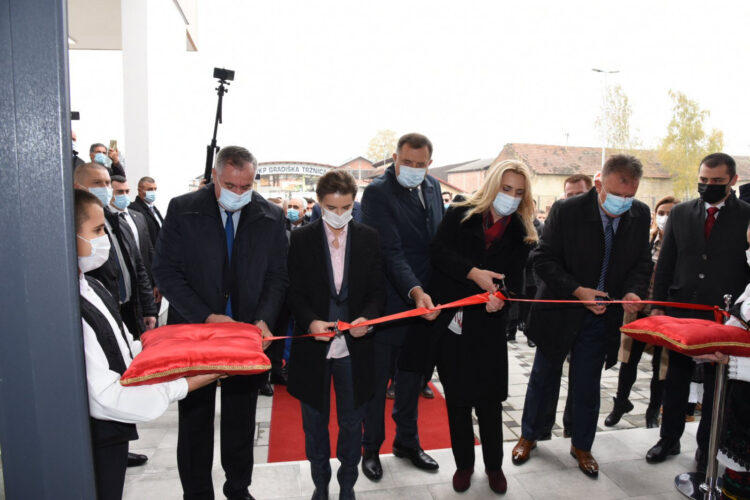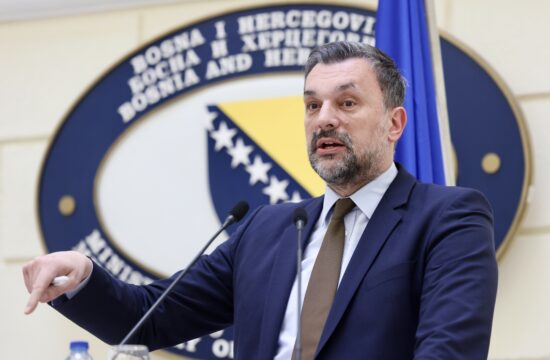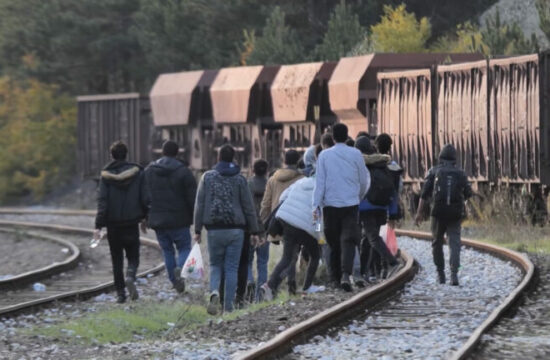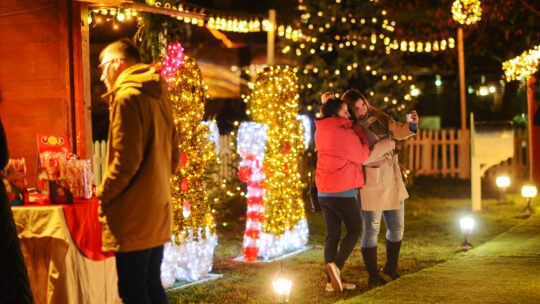
Serbian Prime Minister Ana Brnabic announced several joint infrastructure projects between her country and the Bosnia’s Serb-majority semi-autonomous entity of Republika Srpska (RS) during her visit to the city of Banja Luka on Friday, two days before local elections in Bosnia are to take place.
Brnabic opened a culture center in Nova Topola which Serbia financed with 250,000 euro and said she will talk to the RS President Zeljka Cvijanovic and RS Prime Minister Radovan Viskovic about further joint infrastructure projects, emphasizing that all RS citizens should know that they have the full support of Serbia and that Serbia will continue to support the RS economy.
“We must push forward together and we will continue to be here, whatever the situation may be,” Brnabic said.
She then attended the opening of a multi-purpose facility in the Banja Luka neighbourhood of Petricevac, which will house an ambulance, a kindergarten and the administrative office of the local community. A large part of the construction of the building was financed by Serbia.
Brnabic then met with the Serb member of Bosnia’s tripartite Presidency and leader of the ruling party in the RS, Milorad Dodik, and RS Prime Minister, Radovan Viskovic. The three signed a joint statement regarding the construction of three hydropower plants in the upper basin of the Drina river – a natural border between Bosnia and Herzegovina and Serbia.
Viskovic previously emphasized that this is a capital project for the RS and that all legally prescribed conditions for the construction of three facilities that make up the Gornja Drina (Upper Drina) hydropower system have been met.
Serbia has obtained the majority stakes in the ‘HES Gornja Drina’ joint-venture in which the RS will hold 49 and Serbia 51 percent. The company holds the concession on the three hydroelectric plants with an estimated value of 850 million Bosnian Marks.
“In 2021, we will see in full intensity what it looks like when Serbia and the RS work together,” Brnabic stated. “We will have two huge projects of strategic importance. We are ready to start. When you give us the signal to start preparatory work – we will be ready, and that will be at the end of December or the beginning of 2021,” she said.
Apart from the three plants, Serbia wants to invest 30 million euro into a new airport near the southeastern Bosnian town of Trebinje. It plans to start flights already in 2022.
Milorad Dodik, who has for years been advocating for the secession of Republika Srpska from Bosnia and possibly its integration into Serbia, welcomed the projects and said that Serbia is determined to continue supporting the RS with construction projects and in other ways.
He said that Serbia and the RS already have six common holidays, marking joint events from the past.
“Projects are important. What we have done so far is impressive,” Dodik said. “The communication channels with Serbia across the Drina were neglected and that was not by accident. Someone intentionally tried to split a nation by not building bridges, railways and airports. We feel we need to change that.”
Dodik added that Serbia will finance a bridge with 100 million euro and that it will consider easing the procedures so Bosnian Serbs can get Serbian citizenships faster.
However, two parties based in Sarajevo slammed the idea of Serbia making any deals with a Bosnian entity that concern state property.
The Democratic Front (DF) said the Serb efforts to conclude the Gornja Drina project is illegal and only show that Serbia is not respecting Bosnia’s sovereignty.
The hydro potential of the Drina river belongs to the state of Bosnia and Herzegovina and neither Serbia nor any other country can unilaterally build there just based on unconstitutional agreements with the RS, the party argued.
Serbia already owes Bosnia billions of Bosnian Marks for illegally using the hydro potential of the Drina river and “a continuation of the looting of Bosnia’s public property through illegal entity solutions will not be possible,” the party said, accusing Serbia of violating the the Dayton Peace Agreement that ended Bosnia’s war.
According to the main Bosniak party in the country, the Party for Democratic Action (SDA), the signing of the joint statement between Brnabic and RS authorities represents a grave attack on Bosnia’s sovereignty.
The Serbian government can only negotiate and possibly conclude an agreement on projects on the Drina River with state authorities of Bosnia and Herzegovina, and any attempt to do so with lower levels, which do not have the authority to do so, is a very dangerous violation of the Dayton Peace Agreement which obligates Serbia to respect the sovereignty and internal constitutional order of Bosnia and Herzegovina, the party said.




